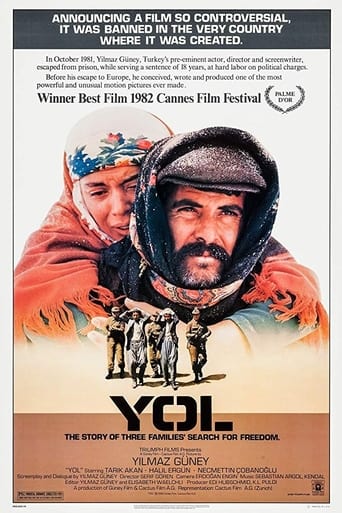ar656
You know you are reading, or watching, a very good story, when the story refers to people from another place, country, continent, and/or culture, where what happens is closely related to their particular environment, and yet, it touches you because what the story says it is also very much applicable to yourself, your situation, your place, your country, your continent, and your culture.The main points of the movie are: 1) You do not need to be behind bars in order to live in a prison. In fact, at some point it becomes evident that most of the main characters are safer in prison than outside. Their lives are certainly more at risk travelling through the country than behind bars.2) Sometimes you do what society tells you you have to do, even when nobody will be better off. This is particularly evident about the end of the movie (spoiler alert), when one of the main characters, upon learning of the death of his brother, tells the widow "I am now your husband; it is the code", even though he has his eyes on another woman in the village, that other woman likes him, he does not want to be the husband of his sister in law, and the widow and her children do not want him to become husband and father. But "it is the code", and that suffices. As when at the beginning one of the characters is out during a curfew that he did not know it was in effect, and is detained. Everybody understands his predicament, but the law says he has to be detained, and so he is. In another story, a man has to kill his unfaithful wife, even though he does not want to.This is a must see. This films will describe not just what was happening in Turkey 30 years ago, but what is happening everywhere today, in one way or another. It is about living in a prison, even though you are supposedly a free citizen.
coldrains_84
Yol was produced in 1982 but it was banned then.Because Yılmaz Guney was a political director so his film was the same.Especially the word Kurdistan was the first thing to be prohibited. If we look at the film the first thing to be said is that in this film we can see the "real" Turkey:what are(were) the conflicts of people in Turkey? How is (was) the atmosphere of politic? We can get the answers of these questions. Secondly there was a super scene which Seyid's wife is frozen and die next to horse which was frozen too.I think there is a message that women and animals have the same destiny in Turkey. The last thing I want to say that to say "Yol is a Turkish film" is incorrect because Yılmaz Guney was not Turc and in that films there are a lot of scenes from Diyarbakır,Urfa and other cities where Kurdish people is majority.
Lee Eisenberg
Turkey is officially the only functioning democracy in the Middle East, along with Israel. But "Yol" shows that regardless of Turkey's official classification, it does have political prisoners. In this case, five of them are given a leave so that they can visit their families. While on their leaves, they (and the audience) get to see the realities of life. They may have been released from prison, but there are some metaphoric prisons that we can never escape, no matter how free we consider ourselves.It was interesting that Yilmaz Guney managed to make this movie from jail. He did a very good job here.
bobbymeizer
The artistry of this movie is astonishing in virtually every aspect of its filmmaking. What makes that all the more remarkable is that the footage was all shot by the assistant director in Turkey then taken to Switzerland for Yilmaz Güney (a brilliant writer/director who had to leave Turkey to escape persecution and imprisonment, mostly because of his empathy for the plight of the Kurdish people under Turkish rule) to edit and dub. The cinematography is colorful, rich and varied. The musical sound track is beautiful and well-integrated. The various subplots seem to echo and build on each other. Somehow, while making the grim realities of modern Turkey all too evident, this film also left me with a feeling of the indomitability of those who struggle for freedom.


